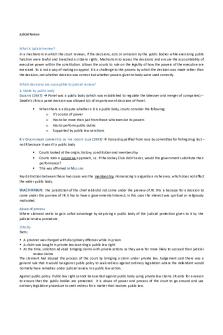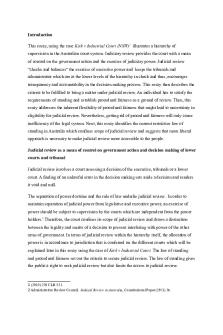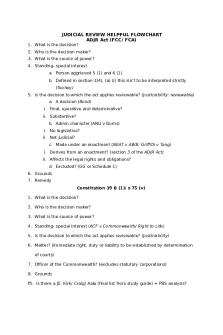Judicial Review Flowchart PDF

| Title | Judicial Review Flowchart |
|---|---|
| Course | Uk Constitutional Law |
| Institution | Durham University |
| Pages | 4 |
| File Size | 108.6 KB |
| File Type | |
| Total Downloads | 54 |
| Total Views | 131 |
Summary
judicial review lecture...
Description
Notes on Judicial Review Example Question: The Planning and Infrastructure Act 2017 provides that, whereas requests for planning permission are normally dealt with by local authorities, ‘the Secretary of State may decide whether – and, if so, subject to what conditions, if any – permission should be granted for major infrastructure projects’. A major airport operating company wishes to build a new airport. However, it anticipates that the local authority, which has a track record of refusing to allow developments unless they are environmentally friendly, will decline to grant permission. It therefore asks the Secretary of State to intervene by exercising her power under the 2017 Act.
1. Standing question: does the claimant meet the requirements under the Senior Courts Act s.31(3) a) This is not merely a preliminary issue: the question of whether C has sufficient interest will be judged within ‘the legal and factual context of the case’. The less the claimant is personally affected, the more serious the issue must be (Fleet Street Casuals), although the idea of ‘sufficient interest’ will be interpreted broadly ( Ibid, per Lord Diplock) b) Associated standing is recognised, but the courts will scrutinise the credentials of the group claiming to stand on another’s behalf (World Development, Greenpeace (No. 2)) 2. Jurisdictional question: was the decision-maker legally entitled to make the decision a) What is a lawful interpretation or definition based on the words in the statute (e.g. ‘what is a major infrastructure project?’) i) The courts ultimately decide this because they have objectivity, consistency and expertise (Anisminic) ii) The courts may also use common law considerations to determine the scope of the prerogative (AG v De Keyser’s Royal Hotel), although certain areas of the prerogative are non-justiciable in principle (Laker Airways) iii) Primary legislation of devolved legislatures can be challenged if it is found to be contrary to the ECHR (Re Northern Ireland Human Rights Commission) iv) Secondary legislation can also be challenged if it was ultra vires the parent Act, including by a defendant in criminal proceedings ( Boddington) b) Do the facts meet this interpretation or definition (e.g. ‘is the airport in question a major infrastructure project?’). The courts will generally decide this if the statutory wording is objective (Khawja), but not if it involves subjective value judgements ( Croydon LBC) c) Has the decision-maker made an error of fact? This will be reviewable (E v Home Secretary) if the information: i) Is relevant ii) Is uncontentious and objectively verifiable iii) Played a material part in the decision iv) And the error was not the claimant’s fault 3. Procedural question: was the decision made through a fair procedure. The two main rationales for procedural fairness is that it encourages good decision-making, and upholds the dignity of individuals affected a) Was the decision-maker impartial, i.e. was there real or apparent ( McCarthy) bias. The decision-maker will be automatically disqualified if i) The decision-maker is a party to the case ( Pinochet (No. 2)) ii) The decision-maker has a financial or proprietary interest in the case’s outcome (Dimes) iii) The decision-maker has a strong personal (but non-financial) interest (Pinochet (No. 2), only applicable in exceptional circumstances) The decision-maker may also be disqualified if iv) “The circumstances would lead a fair-minded and informed observer to conclude that there was a real possibility of bias” ( Porter v Magill, per Lord Steyn) However,
v)
A personal view on a matter will not suffice for disqualification if the decisionmaker approaches the decision with an open mind and has not predetermined the outcome (Island Farm) vi) A small possibility of a benefit uncertainly arising in the future will not suffice for disqualification (Locabail) b) Was the decision-maker’s position independent ( Anderson) i) Did the matter concern criminal or civil rights or obligations? If so ECHR Art.6(1) triggered, independent decision-maker required ( Ali v Birmingham CC, Poshteh v Kensington and Chelsea RLBC, G v X School Governors) ii) Did the matter concern policy decisions? Best taken by a politically accountable decision-maker: Art.6(1) not triggered, possibility of judicial review will suffice for independency (the ‘curative principle’, as judicial review from a full court can cure any earlier lack of independence, Alconbury Developments) c) Was there opportunity for affected individuals to be heard i) Natural justice dictates that all individuals have a right to be informed of the nature of proceedings against them (Ridge v Baldwin) ii) The claimant need only know the gist of the decision made against them, not specific details: however, the claimant must have sufficient knowledge to defend themselves (Bourgass) iii) A number of factors will point to a greater right to be heard: I) If the affected individual stands to lose anything, as opposed to merely standing to miss out on a benefit (Khatun) II) If the affected rights of the individual are particularly significant (e.g. liberty, per Tarrant) III) If doing so is not impractical (e.g. there are not so many applications that oral hearings would be impossible) (Lloyd v McMahon) IV) If the decision involves disputed questions of fact and not merely statistics, so that the type of hearing would actually make a difference (Osborn) V) If there are no considerations against a hearing for the individual, e.g. where disclosing evidence may endanger an informant (Bourgass) d) Were reasons given for the decision. Reasons are not always necessary ( Doody), but some factors point towards requiring them: i) Is there a specific statutory obligation to give reasons (e.g. Tribunals and Inquiries Act 1992 s.10) ii) Are important rights at stake (Doody) iii) Does reason-giving not place ‘an undue burden on the decision-maker’ (Institute of Dental Surgery) iv) Was the decision aberrant (surprising) (Institute of Dental Surgery) v) Is there an established administrative practice of reason-giving which may give rise to legitimate expectation (GCHQ) vi) Does the ECHR Art.6(1) apply to the decision (in which case reason-giving is obliged). This only applies to civil or criminal rights or obligations and not policy decisions (Ali v Birmingham CC, Poshteh v Kensington and Chelsea RLBC, G v X School Governors) e) The substantive outcome of certain exercises of the royal prerogative may not be justiciable, but its procedural fairness may be (Lewis v AG of Jamaica) 4. Exercise question (was the discretion exercised lawfully?) a) If power was delegated by a decision-maker to someone else, was this lawful? This will be determined by several factors: i) If the statute expressly authorises delegation to a certain body, further delegation or delegation to a different body will likely be unlawful (Barnard) ii) Was real power transferred, e.g. agreeing to automatically adopt someone else’s viewpoint or making a decision conditional on another’s approval, or was the decision-maker merely asking for advice ( Lavender and Sons)
iii)
Was power lawfully delegated under the Carltona principle: was the delegated official within the same body or department, sufficiently senior and properly qualified (Re Golden Chemical Products Ltd) iv) Was the power delegated to an executive agency which may (Castle v DPP) or may not (Bourgass) be lawful, depending on the wording of the statute b) Was the power fettered by rigid rules i) The general rule is that consistent application of policy will be encouraged I) In some cases it may be unlawful not to apply a public policy, where diverting from it amounts to a breach of legitimate expectation ( Lumba, Mandalia) II) In some cases the court may hold that the fact that no policy exists is unlawful (Nzolameso v City of Westminster) ii) However, the decision-maker must keep an open mind to altering the rule in exceptional circumstances where there is a good reason to do so ( British Oxygen) c) Was there a question of legitimate expectation (invented by Lord Denning in Schmidt) i) A legitimate expectation can be created in two primary ways: I. Through a commitment that was ‘clear, unambiguous and devoid of relevant qualification’ ( Coughlan) (Bancoult) II. Sometimes through inference from clear past behaviour ( GCHQ) ii) Stuart-Smith LJ in RAM set out six relevant but not conclusive questions, which have been qualified in subsequent caselaw: I. Was the representation clear and unambiguous? II. Was the representation made directly to the claimant or if not, was the claimant within the class of persons who were entitled to rely, or was it reasonable for the claimant to rely on the representation? - A promise or assurance made to a defined group rather than a specific individual may amount to creation of legitimate expectation (MFK) III. Did the claimant rely on the representation? IV. Did the claimant suffer detriment in consequence of their reliance? - C need not necessarily have relied on the expectation to his detriment, but it will be a relevant consideration when considering procedural fairness (Bancoult, per Lord Hoffmann) V. Can the defendant show that overriding public interests entitled it to depart from its promise? VI. Ought the court to exercise its remedial discretion in favour of the claimant? iii) A promise given before an election will not amount to a legitimate expectation (Begbie) iv) Legitimate expectation can be created where D’s actions would amount to a breach of conduct or representation in an equivalent contractual claim (Preston, per Lord Templeman) v) A legitimate expectation may be recategorized as a ‘mandatory relevant consideration’: the decision-maker must take into account the promise they made, even if they do not necessarily have to stick to it ( Bibi) vi) The qualification may be inferred that any guarantee given is under the policy at the time of the guarantee: a guarantee of an outcome is not a guarantee that an existing policy will remain indefinitely (MFK) vii) Two different remedies are available for breach of legitimate expectation: I. Breach of procedural legitimate expectation (e.g. an expectation of an oral hearing) will entitle C to fair treatment through the process they were expecting (Ng Yuen Shiu) II. Breach of substantive legitimate expectation (e.g. a promise to provide a specific outcome) will oblige the decision-maker to reconsider when concerning a broad policy decision (Bibi) or may lead to an overturning
of the decision in exceptional circumstances where the decision affects a small group of individuals (so it is more rights-based and less policybased) and where unfairness caused to C outweighs the public detriment caused by the decision-maker sticking to their promise ( Coughlan) d) Were all relevant legal matters considered and all irrelevant legal matters ignored (Padfield) e) Was there a specific purpose for the delegation of authority to the decision-maker. He can only use it for that purpose (or those purposes), where the statute explicitly states what that purpose is (Campbell) and where the courts must infer legitimate uses of the power (Congreve v Home Office) 5. Substantive question (was the decision’s outcome lawful?) Two tests can be applied: a) Wednesbury unreasonableness: was the decision “so unreasonable that no unreasonable authority could ever have come to it”? i) A higher threshold of ‘Super-Wednesbury unreasonableness’ may apply where the decision concerns political and economic policies and allocation of funding, granting greater discretion to the decision maker (Lord Bridge in Hammersmith) ii) A lower threshold of ‘Sub-Wednesbury unreasonableness’ may apply where the decision concerns legal matters such as individual rights, granting less discretion to the decision-maker and subjecting him to greater scrutiny (Brown LJ in Smith) b) The proportionality test (Lord Bingham in Daly): i) Has a protected interest (e.g. a human right or a right under EU law) been compromised by the decision in question? ii) Was the interest compromised in the pursuit of some legitimate aim? iii) Was it necessary to compromise the protected interest to that extent in order to achieve the aim? I. Deference may be exercised here if the decision required specific expertise from the decision-maker (Nicklinson) iv) Is there an adequate relationship of proportionality between the damage to the interest and the positive consequences of achieving the aim? II. Deference may be exercised here if the decision-maker’s democratic credentials better qualify him to make policy decisions ( Carlile), (Belmarsh) c) Proportionality may be applied in cases involving the common law ( per Lord Bingham in Daly): i) Lord Carnwath in Pham claimed that the labels of proportionality and Wednesbury unreasonableness are unhelpful, and that the intensity of scrutiny may vary somewhere between the two of them ii) Lord Mance in Pham suggested that proportionality should apply to common law cases in some cases, pointing out that proportionality is more structured but not necessarily more intense iii) Lord Mance in Kennedy claimed that “there seems no reason why such factors [in favour of proportionality] should not be relevant in judicial review even outside the scope of Convention and EU law” d) The issue is not whether the decision was correct: the appeal/review distinction must be maintained (Fewings) e) In general, the more political the nature of a question is, the more suitable political institutions are for dealing with it and the less appropriate a judicial decision on the matter is (Belmarsh, per Lord Bingham) f) If a decision-maker has acted unreasonably in not exercising a discretion, they may be issued with a mandatory order (M v Home Office)...
Similar Free PDFs

Judicial Review Flowchart
- 4 Pages

Judicial Review
- 15 Pages

Judicial Review
- 50 Pages

Judicial Review
- 6 Pages

Judicial Review
- 40 Pages

Judicial Review
- 7 Pages

Judicial Review Complete 2
- 54 Pages

Judicial Review (ALL!)
- 8 Pages

Judicial Review- irrationality
- 4 Pages

Judicial Review notes
- 1 Pages

Analisis Sejarah Judicial Review
- 5 Pages

ADMIN LAW Judicial Review
- 5 Pages

Ilegality - Judicial Review
- 5 Pages

Judicial Review Notes
- 6 Pages

Judicial Review Essay
- 3 Pages
Popular Institutions
- Tinajero National High School - Annex
- Politeknik Caltex Riau
- Yokohama City University
- SGT University
- University of Al-Qadisiyah
- Divine Word College of Vigan
- Techniek College Rotterdam
- Universidade de Santiago
- Universiti Teknologi MARA Cawangan Johor Kampus Pasir Gudang
- Poltekkes Kemenkes Yogyakarta
- Baguio City National High School
- Colegio san marcos
- preparatoria uno
- Centro de Bachillerato Tecnológico Industrial y de Servicios No. 107
- Dalian Maritime University
- Quang Trung Secondary School
- Colegio Tecnológico en Informática
- Corporación Regional de Educación Superior
- Grupo CEDVA
- Dar Al Uloom University
- Centro de Estudios Preuniversitarios de la Universidad Nacional de Ingeniería
- 上智大学
- Aakash International School, Nuna Majara
- San Felipe Neri Catholic School
- Kang Chiao International School - New Taipei City
- Misamis Occidental National High School
- Institución Educativa Escuela Normal Juan Ladrilleros
- Kolehiyo ng Pantukan
- Batanes State College
- Instituto Continental
- Sekolah Menengah Kejuruan Kesehatan Kaltara (Tarakan)
- Colegio de La Inmaculada Concepcion - Cebu
